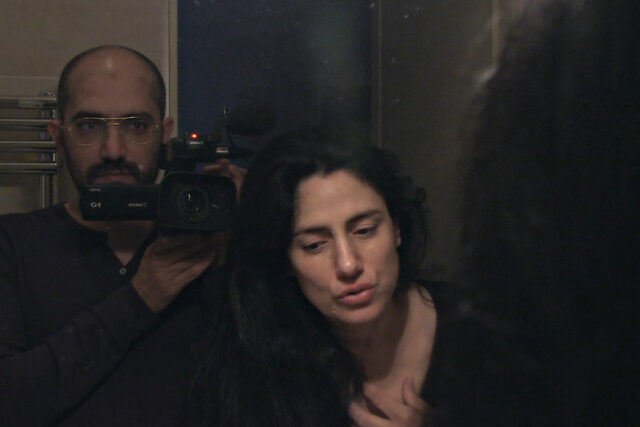
Shlomi Elkabetz documents the making of Gett: The Trial of Viviane Amsalem with his sister, Ronit
BLACK NOTEBOOKS: RONIT (CAHIERS NOIRS: RONIT) (Shlomi Elkabetz, 2021)
New Plaza Cinema @Macaulay Honors College
35 West Sixty-Seventh St. between Central Park West & Columbus Ave.
Opens Friday, November 11
panoramafilmsus.com
newplazacinema.org
About halfway through his award-winning documentary Black Notebooks: Ronit, director Shlomi Elkabetz says in a gentle voice-over, “And so it happened. And I just observe. The parting and final conversations, and last words, if there were any, passed us by, like in a film, above and beneath life, and silence in life is the same as the silence of death.”
Shlomi is talking about his relationship with his sister, Israeli film star Ronit Elkabetz, who can be heard saying, “It’s over.” Shlomi, pensively looking out a window, turns to face the camera and continues, “And the same silences are still there. You and I still speak.” Shlomi then switches to a close-up of Ronit as he concludes, “And we never parted.” He next cuts back and forth between his and his sister’s faces before he gets up and walks away, then shows Ronit sitting by herself at a table with an empty chair.
The companion piece to Black Notebooks: Viviane, Black Notebooks: Ronit is a powerful and often uncomfortably intimate behind-the-scenes story about the making and marketing of the 2014 film Gett: The Trial of Viviane Amsalem, the final work of a trilogy that began with To Take a Wife and Shiva. The three films were cowritten and codirected by the siblings and star Ronit (Late Marriage, The Band’s Visit) as the unhappily married Viviane Amsalem. In Gett, Viviane has filed for divorce in a religious court, the three-man beit din, seeking to obtain a gett, which will grant her freedom from her husband (Simon Abkarian), who refuses to let her go.
Fighting the lung cancer that will eventually kill her in 2016 at the age of fifty-one, Ronit is having difficulty with the movie. She forgets her lines and prefers to spend time with her two young children rather than do yet another take of a scene. “I can’t stand being so exposed anymore,” she tells her brother, explaining that she has lost her desire to act. But Shlomi is determined to finish the film, helping Ronit do the work any way he can, bringing family to visit the set, feeding her dialogue, and giving her extra time between shots. Her costar Menashe Noy, who plays her advocate, Carmel Ben-Tovim, watches her closely, not always sure what to do.
At one point, on the media tour supporting Gett, Ronit is standing in front of a mirror as Shlomi, visible in the reflection, films her with a small handheld camera. “Why not give an interview? Am I afraid? Yes, I’m afraid,” she says. “And I don’t want my fear to run my life. I don’t want that to happen; right away I say to myself: Okay, I don’t want to cooperate with fear.” Through it all, Shlomi holds the camera at chest level as he gazes at his sister, neither looking through the lens nor worrying about the angle. Duality, mirroring, and life versus the depiction of life are the inescapable themes.
“We’ll do the most amazing things, despite and because of the limitations!” Ronit tells her brother, although it’s clear that it won’t be easy. As Ronit becomes sicker, Shlomi grows more poetic, but neither will give up the fight.
Directed by Shlomi and cowritten with frequent collaborator Joelle Alexis, Black Notebooks: Ronit does a beautiful job of paralleling Viviane’s battle to obtain a gett with Ronit’s real-life struggle against cancer. When one of the beit din judges says to her, “Accept your fate. There’s nothing more I can do,” Ronit, as Viviane, shakes her head and covers her face with her hands, a reaction that could be Ronit being given a fatal diagnosis. The audience roots for both women, fictional and real; one melds into the other, lending a hybrid nature to the storytelling.
When Shlomi speaks of casting Noy, he points out, “Here, Menashe plays Carmel Ben-Tovim, who tries to save Viviane. And what I see is myself fighting alongside you. And now, when I look at the two of you” — Shlomi cuts to a shot of Noy looking over at a solemn yet steadfast Viviane — “I see me and you. But when I try to plead for you . . . It’s too much for me.” It’s almost too much for us as well, especially with the sweeping melodramatic score, featuring original music by Dikla and Yiftach Shahaf in addition to the Israel Symphony Orchestra performing Bernard Herrmann’s “Vertigo: Suite,” from the Alfred Hitchcock film in which Kim Novak plays two different women whom Jimmy Stewart’s character tries to make the same.
Winner of the Israeli Ophir Award for Best Documentary, Black Notebooks: Ronit opens November 11 at New Plaza Cinema, with Shlomi Elkabetz participating in Q&As on November 11 at the 7:45 show with American actor John Turturro (Miller’s Crossing, Barton Fink), on November 12 at the 7:30 screening with American novelist Nicole Krauss (Forest Dark, The History of Love), and on November 13 at the 4:30 show with Israeli actress Mili Avital (Dead Man, Prisoners of War).